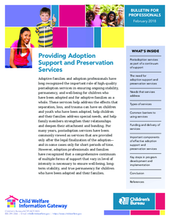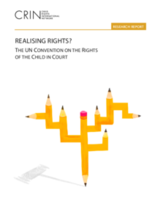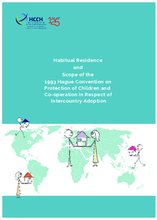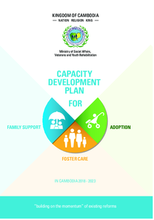Displaying 281 - 290 of 631
This bulletin draws from available literature and practice knowledge to summarize key issues related to providing effective services to support the stability and permanency of adoptions.
In the current study the authors examined associations between children's pre-adoption experiences (type of pre-adoption care and early deprivation) and their adaptive and maladaptive behavioral adjustment.
This study evaluates the ‘Nurturing Attachment’ program in the UK, a Dyadic Developmental Psychotherapy intervention for adoptive families.
In this study, the authors examined the process of how relationships are built between Ethiopia adoptees and their adoptive families within the new family setting.
The present study concerning domestic adoption explored the adjustment of 37 adolescents and 22 emerging adults (with age ranging between 11 and 18 and 18 and 24 years, respectively), adopted through an Italian form of open adoption, and analyzed the quality of adoptive family relationships and adoptees' attachment as possible moderating variables in the relation between multiple pre-adoptive risk factors and adoptees' outcomes.
The present study examined whether the prospective association between cumulative pre-adoptive risk (e.g., maltreatment, age at placement, foster placement instability, ever having lived with birth parent) and adolescent/young-adult substance use was mediated by childhood internalizing and externalizing problems in youth adopted from foster care.
This report by the Child Rights International Network (CRIN) draws out the ways the Convention on the Rights of the Child (CRC) has been used around the world to challenge abuses of children’s rights, but also where it has been misunderstood and misapplied by national courts.
This Note from The Hague Conference on Private International Law aims to promote the proper interpretation and application of Article 2 of the Hague Convention of 29 May 1993 on Protection of Children and Co-operation in Respect of Intercountry Adoption (“1993 Hague Convention” or “Convention”).
This Plan presents key findings and 23 recommendations, sub-divided into short-term, medium-term and long-term actions, for an effective and efficient implementation of foster care, adoption and family support in Cambodia.
This information sheet outlines provincial adoption provisions for Indigenous children.





